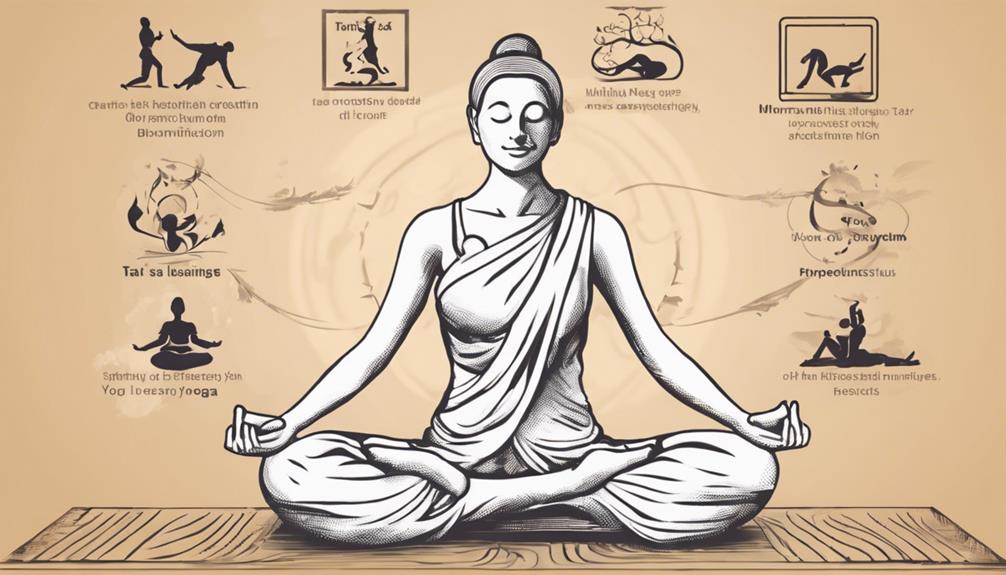Travel back in time to witness ancient civilizations pioneer mindfulness, meditation, and visualization for stress relief. They recognized the power of deep breathing, muscle relaxation, and guided imagery. Over the years, these techniques evolved to foster positive behavior changes and enhance emotional regulation. The mind-body connection became crucial in managing stress, with meditation and mindfulness playing key roles. Boost confidence with affirmations, self-hypnosis, and visualization. Explore modern subliminal hypnosis advancements for rewiring negative thoughts and reducing stress. Unravel the neurological effects of stress relief techniques and discover future trends in subconscious stress management.
Historical Roots of Subconscious Techniques
Explore the ancient origins of subconscious stress reduction techniques to understand their evolution and effectiveness in modern practices. The roots of these techniques can be traced back to ancient civilizations where mindfulness, meditation, and visualization were used to manage stress and promote well-being.
In these ancient cultures, such as ancient Egypt, Greece, and India, these practices were deeply intertwined with spiritual beliefs and rituals, highlighting the psychological influence of such techniques on individuals. Ancient origins reveal a profound understanding of the mind-body connection and the importance of mental well-being in overall health.
Practices like deep breathing, progressive muscle relaxation, and guided imagery were utilized to calm the mind and reduce stress, showcasing an early recognition of the power of subconscious techniques in promoting relaxation and mental clarity.
Impact on Behavior Modification
Utilizing subconscious stress reduction techniques can significantly impact behavior modification by fostering positive changes in thought patterns and emotional responses. Cognitive restructuring plays a crucial role in behavior modification by helping individuals identify and challenge negative thought patterns that contribute to stress and maladaptive behaviors. By restructuring these thoughts, individuals can cultivate a more positive mindset and approach to handling stressors.
Emotional regulation is another key component in behavior modification, as it involves developing skills to manage and express emotions effectively. Mindfulness, a practice that encourages being present in the moment without judgment, can enhance emotional regulation by promoting self-awareness and reducing impulsivity in responses to stressors.
In addition to cognitive restructuring and emotional regulation, relaxation techniques such as deep breathing exercises and progressive muscle relaxation can help individuals alleviate physical tension and promote a sense of calmness, further contributing to behavior modification by reducing the physiological symptoms of stress.
Stress Reduction Mechanisms Explored
By delving into various stress reduction mechanisms, you can uncover effective ways to manage and alleviate stress in your daily life. The mind-body connection plays a crucial role in stress reduction. When your mind is calm, your body follows suit, triggering a relaxation response that helps combat stress. Practices like meditation and mindfulness techniques are powerful tools to enhance this mind-body connection and foster relaxation.
Meditation involves focusing your mind and eliminating distracting thoughts. By regularly practicing meditation, you can train your mind to stay present and reduce stress levels.
Mindfulness techniques, on the other hand, encourage you to be fully aware of the present moment without judgment. This heightened awareness can help you recognize stress triggers and respond to them in a more composed manner.
Incorporating these stress reduction mechanisms into your daily routine can significantly improve your ability to manage stress and promote overall well-being. Take the time to explore these techniques and find the ones that resonate most with you for optimal stress relief.
Boosting Confidence Through Suggestions
Enhancing your confidence through positive suggestions can be a powerful way to boost your self-esteem and belief in your abilities. By incorporating positive affirmations and self-hypnosis into your daily routine, you can rewire your subconscious mind to focus on empowering thoughts and beliefs.
Here are three key ways these techniques can help you boost your confidence:
- Positive Affirmations: Repeating positive statements about yourself can help challenge and overcome negative self-talk, replacing it with a more optimistic outlook on your capabilities and potential.
- Self-Hypnosis: Through guided self-hypnosis sessions, you can access your subconscious mind and plant suggestions that enhance your confidence, creating a lasting impact on your self-perception.
- Visualization: Using visualization techniques during self-hypnosis or affirmations can help you vividly imagine yourself achieving your goals, reinforcing your belief in yourself and increasing your confidence levels.
Modern Applications in Subliminal Hypnosis
Modern applications in subliminal hypnosis have evolved to incorporate advanced technology and innovative techniques for subconscious reprogramming. By harnessing the mind-body connection, practitioners can tap into the subconscious mind to promote therapeutic benefits and aid in subconscious healing for psychological wellness.
These modern approaches utilize subliminal messages, often embedded in audio tracks or visuals, to communicate directly with the subconscious mind below the threshold of conscious awareness. Through this method, individuals can rewire negative thought patterns, boost self-esteem, and alleviate stress and anxiety.
Subliminal hypnosis has been shown to be effective in enhancing confidence, improving sleep quality, and reducing symptoms of depression. By targeting the subconscious, this technique can bypass conscious resistance and work on a deeper level, facilitating long-lasting changes in behavior and mindset.
Neurological Effects on Stress Response
Understanding the neurological effects on stress response can provide valuable insights into how our brain and body react to various stressors. When stress triggers our brain, it initiates a cascade of reactions that impact our overall well-being.
Here are three key points to consider:
- Brain Chemistry: Stress influences the release of neurotransmitters such as dopamine, serotonin, and norepinephrine, which play a crucial role in regulating mood and emotional responses.
- Stress Hormones: The body releases cortisol and adrenaline in response to stress, preparing us for the 'fight or flight' response. Prolonged exposure to these stress hormones can have detrimental effects on our physical and mental health.
- Neuroplasticity: Chronic stress can alter the structure and function of the brain, affecting memory, decision-making, and emotional regulation. Understanding how stress impacts neuroplasticity is essential in developing effective stress management strategies.
Future Trends in Subconscious Stress Relief
Exploring innovative approaches to subconscious stress relief can offer new insights into enhancing overall well-being and mental health. Future trends in subconscious stress relief are leaning towards the integration of advanced technologies like virtual reality (VR) and biofeedback.
VR environments can transport you to calming settings, providing a temporary escape from stressors. Biofeedback devices enable you to monitor and control physiological responses, empowering you to regulate stress levels effectively.
In addition to technology, traditional practices such as mindfulness and aromatherapy are gaining popularity for their stress-relieving benefits.
Mindfulness techniques encourage you to stay present, fostering a sense of calm and reducing anxiety. Aromatherapy utilizes essential oils to promote relaxation and alleviate stress symptoms through the sense of smell.
Conclusion
As you journey through the labyrinth of stress, remember that the key to unlocking peace lies within your subconscious mind.
Like a hidden treasure waiting to be discovered, subconscious stress reduction techniques offer a pathway to serenity and tranquility.
Embrace the power of suggestion, tap into the depths of your mind, and let go of the burdens that weigh you down.
The evolution of these techniques holds the promise of a brighter, stress-free future.
Dr. John Renoldson is a distinguished professor of Clinical Research Hypnotherapy He holds a PhD in Clinical Psychology and specializes in hypnotherapy and scientific research to enhance therapeutic outcomes. Dr. Renoldson has authored numerous peer-reviewed articles on the efficacy of hypnosis in treating conditions.




